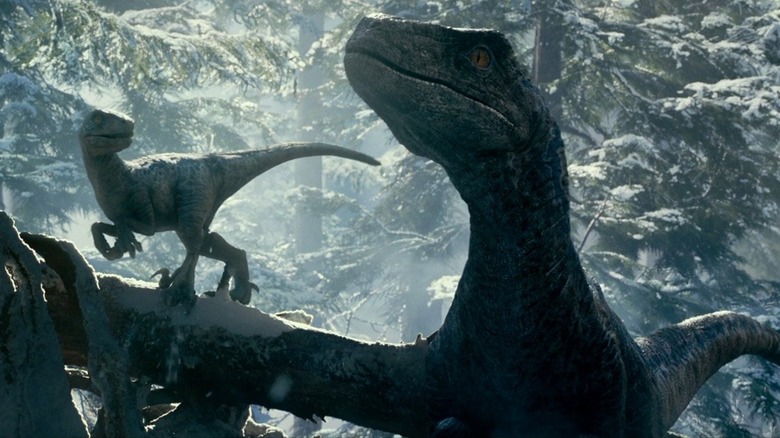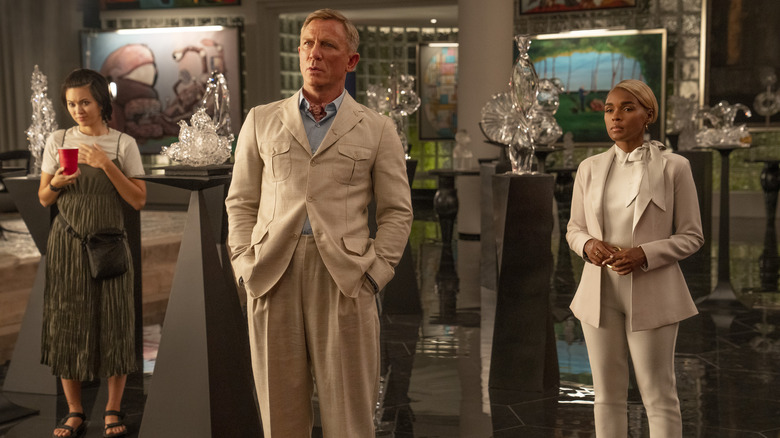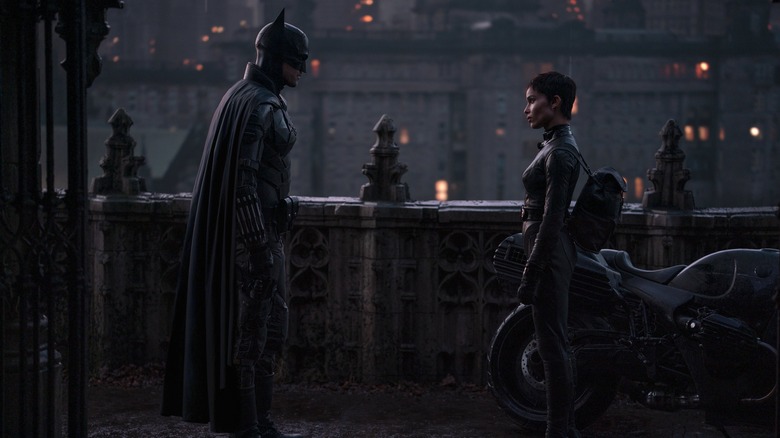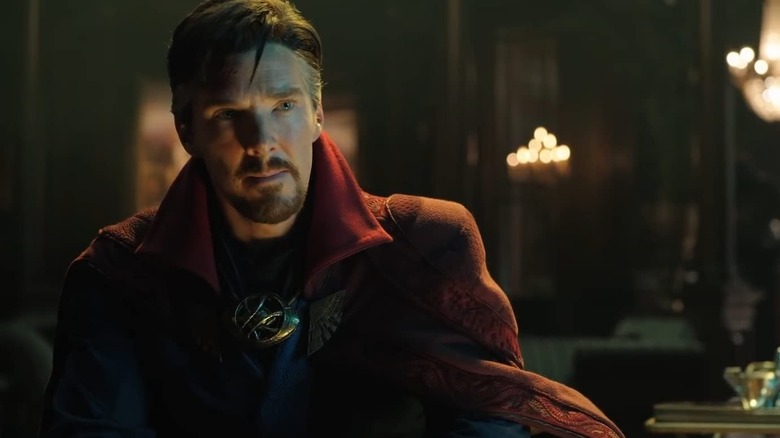The 2022 Box Office Exit Survey: The Good, The Bad, And What Comes Next
There was a time (it feels like an eternity ago) that so many in the movie business thought the climb out of the pandemic was going to be swift, looking to 2021 as the industry's big comeback year. Was it a comeback compared to 2020? Absolutely. But the attempt to regain something resembling normalcy in the theatrical marketplace has been far slower than anticipated, with 2024 or even 2025 pegged as the time when the dust will finally settle at this point. This to say, we've got a long road ahead.
Be that as it may, 2022 served as an encouraging year in many ways. Thanks to huge hits like "Top Gun: Maverick," "The Batman," "Minions: The Rise of Gru," "Doctor Strange in the Multiverse of Madness," "Jurassic World Dominion," and "Avatar: The Way of Water," the domestic box office is expected to finish at $7.4 billion, which would be about a 67% improvement over last year's $4.48 billion tally. Things are looking up, though not everything is trending in the right direction. We're still seeing blockbuster disasters such as "Moonfall," after all.
So, how did things look overall this year? What areas did we make great strides in at the box office? What areas left room for improvement? What lessons did we learn? And, most importantly, what lies ahead in the near future? Today, we're going to go over the year in detail, from the studios that won out, the movies that performed the best, the movies that performed poorly, and everything in between. Let's dig in, shall we?
The box office, overall, is rebounding (with a catch)
As of this writing, the final, global box office total for 2022 has not been calculated, but it's going to follow the domestic trend and end up well ahead of where things were in 2021, when ticket sales totaled $21.4 billion globally. Case in point: The top ten movies of 2021 grossed $7.6 billion worldwide (and that's counting the massive amounts of money "Spider-Man: No Way Home" made in 2022), while the top ten in 2022 made $8.8 billion. Plus, we had three different movies cross the $1 billion mark this year, with "Top Gun: Maverick," ($1.48 billion), "Avatar: The Way of Water," ($1.03 billion and climbing), and "Jurassic World Dominion" ($1 billion) all pulling past the milestone. Last year, "No Way Home" ($1.9 billion) was the only one to pull this off.
It's also important to note that it wasn't just your typical blockbusters putting meat in seats this year. In 2022, were it nor for superhero movies and horror franchises, things would have looked dire. However, this year saw original horror movies like "Smile" ($216 million) make an unexpected killing. We also had hit theatrical rom-coms with "The Lost City" ($190 million) and "Ticket to Paradise" ($167 million), proving that Netflix doesn't own the market on that genre. Then there were the surprise low-to-mid-budget winners "Barbarian" ($50 million), "Everything Everywhere All at Once" ($103 million), "Where the Crawdads Sing" ($140 million), and "RRR" ($102 million).
Couple all of that with the fact that big franchise movies such as "The Batman" ($770 million), "Doctor Strange in the Multiverse of Madness" ($955 million), "Thor: Love and Thunder" ($760 million), "Sonic the Hedgehog 2" ($402 million), and even "Jackass Forever" ($80 million), delivered the goods, and the overall picture looks damn fine. The problem? Adult-skewing original movies and awards season fare is still struggling mightily.
The biggest challenge ahead? Original, non-horror movies
The list of wins looks nice this year when laid out like that, but it felt like week after week, we were getting some original movie or adult-skewing film that just couldn't find its audience in theaters. From "Tar" ($5.5 million) to "See How They Run" ($22 million), and even Steven Spielberg's "The Fabelmans" ($11 million), seemingly anything original and/or intended for adults that wasn't made for next to no money had an almost impossible time drawing a crowd in theaters. Heck, even the commercial-friendly "The Northman" bombed with $69 million against a $90 million budget. "Everything Everywhere All at Once" was the exception this year, far from the rule.
It seems the only genre where originals can thrive right now is horror, with "Barbarian" and "Smile" proving that well enough. But even original genre films struggled, with "Bodies Bodies Bodies" ($13 million) underperforming a bit, for example. The reason this is concerning is that many of these original misfires are going to cost studios money. In the case of something like "Amsterdam," which made just $31 million against a $90 million budget, or "Babylon," which just crashed and burned in similar fashion, a lot of money. Studios are only going to put up with those losses for so long.
At what point do major studios like Disney or Warner Bros. say to hell with it on that front? Make 'em for streaming, make 'em cheap, or don't make 'em at all. For me, it comes down to the industry at large being willing to bite the bullet for a bit, market these movies hard, find ways to appeal to older moviegoers, and don't surrender on this front entirely. There is too much to be lost here for everyone to just throw in the towel.
Superheroes, amazingly enough, did not reign supreme
As mentioned earlier, superheroes were about the only thing that went right in 2021 outside of horror. In truth, superheroes have been dominating the charts for the better part of 20 years thanks to the Marvel Cinematic Universe. But for the first time in a very, very long time, the top three spots on the charts this year are occupied by something other than superhero films. Those spots belong to "Top Gun: Maverick," ($1.48 billion), "Avatar: The Way of Water," ($1.03 billion), and "Jurassic World Dominion" ($1 billion), which we pointed out were the only movies to cross the $1 billion mark this year. As such, they take the gold, silver, and bronze medals, respectively.
Sure, these movies are all still sequels in big franchises, but it's encouraging that stuff well outside the superhero realm did so well this year. Particularly "Maverick," which took everyone by surprise on its way to becoming one of the highest-grossing movies ever. It did so by bringing out older moviegoers who had largely been staying away from theaters since the pandemic started. Serving underserved audiences works. Again, look at stuff like "The Lost City" or "Ticket to Paradise." The superhero boom may be over one day and, if that day does come, there are other paths to blockbuster success, that much is certain.
It's time to say goodbye to expensive streaming-only releases
2020 forced the industry at large to pivot and pivot fast, with streaming offering an attractive alternative (since people could still safely watch stuff from home). Sure, Netflix had already begun the streaming revolution, but 2020 accelerated it greatly. 2022 showed the pitfalls of that mentality. Netflix's stock plummeted, AMC had to lay off a ton of staffers because streaming revenue just isn't there yet, and Disney even suffered in some ways by going so hard on Disney+. In essence, they trained their customers to expect certain things on streaming rather than something that requires a trip to the movie theater. Apologies to Pixar.
Meanwhile, studios like Paramount and Warner Bros. began to realize that theatrical success, ultimately, leads to streaming success. "The Batman" became a gigantic hit in theaters, then went on to garner a huge audience on HBO Max. Similarly, Paramount's hits like "The Lost City," "Jackass Forever," and "Scream" all made their money in theaters, then had success on VOD, and ultimately drew bigger audiences on Paramount+ because of all the buzz their successful theatrical releases created.
Even theatrical misfires such as "Lightyear" seemingly benefited from a theatrical release, in the end, as the movie did huge numbers on Disney+ after the fact. So, even though it was a theatrical bomb, that was some revenue to make up for some production costs, before ultimately becoming a streaming play to attract subscribers anyway. The biggest evidence that expensive streaming-only releases make no sense anymore? Netflix had huge success with "Glass Onion: A Knives Out Mystery" in limited release for a single week. Quite frankly, in 2023 and beyond, movies above a certain budget level seemingly have no business going straight to streaming.
It's time to say goodbye to China, Hollywood
For about a decade, Hollywood had an obsession with maximizing box office totals by targeting China, which had become the second largest moviegoing market in the world behind only the U.S. In some cases, movies were straight up bailed out by China, such as "Warcraft" ($225 million of its $439 million worldwide total). But those days are long gone and the pandemic sealed the deal. The country has since prioritized its own movies, such as "Wolf Warrior 2" or "The Battle at Lake Changjin," which did blockbuster numbers with no help from Hollywood.
In 2022, Chinese regulators made it especially tough for American movies to open in the country, with only a select few getting through. Even when they did open in China, the results weren't great. "The Batman," for example, made just $25.3 million of its massive total in the Middle Kingdom. And let us not forget that only about a quarter of that money makes it back to the studio, due to hefty international taxes and such. In other words, a drop in the bucket, as far as these things go. "Godzilla vs. Kong" was the exception, not the rule, in this regard.
Even "Avatar: The Way of Water" has underperformed in China up to this point, taking in $105 million of its $1.03 billion total — a far cry from the $261 million the original did in the country. The point is, Hollywood needs to do it without China from here on out. If the movie doesn't make sense, financially speaking, without robust grosses from China, then it doesn't make sense at all. Chinese box office dollars can only be viewed as a bonus in 2023 and beyond.
Disney made the most money, but it was still a rough year
Disney was, ahead of the pandemic, the unquestioned king of the box office. In 2019, the studio made a staggering $11.1 billion, with seven of its movies grossing at least $1 billion and, in the case of "Avengers: Endgame," $2.8 billion making it, for a time, the highest-grossing movie ever. But that was an eternity ago, it seems. Things have changed radically and, as it stands, Disney isn't the power player it used to be.
Yes, Disney is the only studio to cross the $4 billion mark in a calendar year since the pandemic began. That number is bolstered by hits like "Black Panther: Wakanda Forever" ($805 million). But the $4.3 billion or so the Mouse House will end up with this year is propped up by a lot of big flops and disappointments, such as "Lightyear," "Strange World," "Amsterdam," "The Bob's Burgers Movie," "See How They Run," and "Empire of Light." All told, the studio had more misses than hits, and some of those misses were legendarily bad, with "Strange World" ($66 million worldwide against a $180 million budget) ranking as, perhaps, the biggest bomb in the studio's history.
With former CEO Bob Chapek out and Bob Iger back in as the head of the company, 2023 figures to look very different. Be that as it may, Disney still has a lot of work to do in order to get back to the glory of its pre-pandemic days. The question is, can they get back on top? Or is the era of presumed Disney box office dominance over? 2023 may hold the answers.
The 2022 box office winner: Paramount Pictures
Paramount Pictures is not, by any means, the biggest studio in town. They pale in comparison to giants like Disney and Warner Bros. Discovery. That might be why the studio could end up being sold in the not-too-distant future. Paramount+ is not nearly as big as its streaming competitors, and the studio doesn't have nearly as much IP to mine for major franchises. Be that as it may, Paramount laid out the perfect post-pandemic playbook in 2022, and executed it to near perfection, with arguably one lone blemish on its entire slate.
From holding "Top Gun: Maverick" for a full two years knowing they had a hit worth maximizing, to reviving franchises like "Scream" and "Jackass," no studio had a more diverse stable of hits. They brought a big hit rom-com with "The Lost City," they had a hit sequel with "Sonic the Hedgehog 2," they had the biggest horror movie of the year with "Smile," and they even made some money with "Orphan: First Kill" even though it went directly to Paramount+. They weren't just winning one way — they were winning in every way possible. Even looking at the movies they sent direct to streaming, such as "Jerry and Marge Go Large," they appeared to pick the right bets for the right distribution channel.
Paramount arguably made the wisest decision of the year with "Smile," a movie that was originally supposed to go directly to Paramount+. But following good test screenings, the studio thought better of it and was rewarded for their good thinking. Were it not for the bombing of "Babylon," the studio would maybe have a perfect record for 2022. But the movie business is always a gamble and nobody is perfect. As far as the future goes? Paramount had the perfect template for sustained success. Period.







